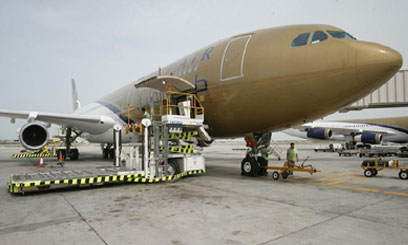 NAIROBI, Kenya, Oct 15 – Bahrain’s national carrier Gulf Air has launched electronic Air Waybill (e-AWB), replacing the traditional paper Air Waybill that consumed significant time, cost and paperwork.
NAIROBI, Kenya, Oct 15 – Bahrain’s national carrier Gulf Air has launched electronic Air Waybill (e-AWB), replacing the traditional paper Air Waybill that consumed significant time, cost and paperwork.
The first cargo shipment under the e-AWB was moved from Bahrain to Dubai recently joining the ranks of a very few e-Freight capable airlines in the region.
Gulf Air CEO Samer Majali said: “This is indeed a great achievement as it involves several stakeholders in the entire cargo supply chain such as freight forwarders, handling agents and customs and civil aviation authorities to ensure the seamless electronic process from beginning to end.”
“We are hopeful of turning our Bahrain hub into a complete e-freight station by the middle of 2014 with support from Bahrain Civil Aviation Authority, Bahrain Airport Company, Bahrain Airport Services and freight forwarders in tune with IATA’s vision of achieving 100 percent e-freight by 2015,” he added.
Since June 1, Gulf Air has increased its flights between Nairobi and Bahrain from five to seven times a week in each direction in an attempt to meet growing passenger numbers.
The frequency increase has provided greater choice of flights for passengers to fly to their destinations with short transit times at Bahrain airport in both directions.
The new frequency in particular has connected Nairobi to new markets via Bahrain, which include Copenhagen, Rome, Chennai, Kochi, Lahore, Jeddah, Amman, Beirut, Istanbul and Larnaca.
Gulf Air is currently operating an Airbus A320 in a two-class configuration of 16 seats in Falcon Gold and 120 in economy, and has the capacity to carry four tons of freight to and from Nairobi.
International Air Transport Authority (IATA) Regional Vice President for Middle East and North Africa Hussein Dabbas said: “IATA congratulates Gulf Air on its first e-AWB shipment and becoming only the third Gulf-based airline to achieve this capability.|
“The e-AWB is a crucial step towards adoption of full e-Freight, which replaces up to 20 paper documents with electronic versions for every shipment. E-Freight increases the speed and security of air cargo, which will serve to benefit world trade and economic growth,” he explained.
Senior Manager of Cargo Services Gulf Air and Chairman of the Air Cargo Working Group in Bahrain Khalid Faqih noted that; “In today’s electronic world, air cargo still relies heavily on paper documentation with each international airfreight shipment requiring over 20 different paper documents; this not only increases the cost of airfreight but also delays the transit period.
“Besides, it is also not an environment- friendly practice to use tonnes of paper. By switching to e-AWB, we have addressed all these issues- lower costs, faster supply chain transit times, greater accuracy and adherence to regulatory compliance,” he added.
With the e-AWB implementation, all cargo will be tagged with bar code labels in accordance with IATA’s cargo specifications making it easier for the airline as well the customer to track and follow the cargo while in transit.
The e-AWB will be introduced across Gulf Air’s network progressively in the coming months as it requires parties in the entire supply chain such as freight forwarders, airlines, handling agents and customs authorities to modify their systems capable of accepting and approving e-AWB information.
Gulf Air has been in the forefront in implementing e-freight, a project initiated by IATA. The airline has already implemented an e-Freight compliant IT system and last year introduced Cargospot- a fully integrated end-to-end cargo management solution.


































